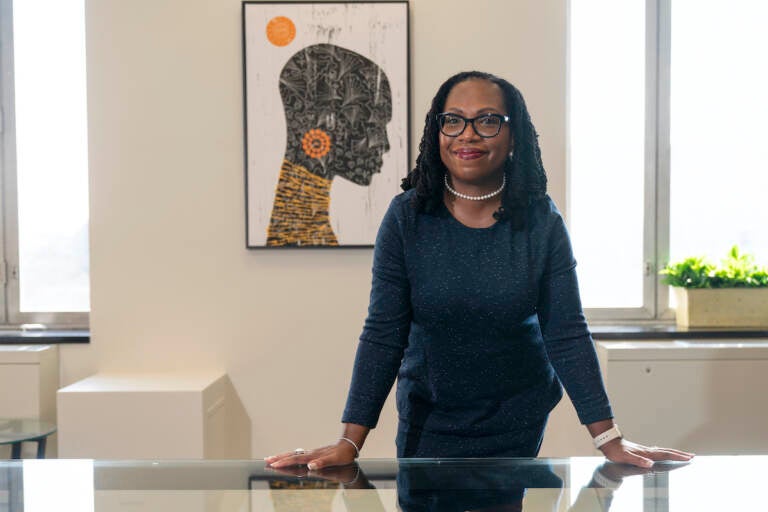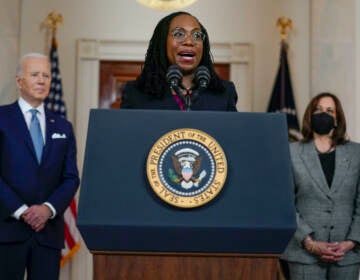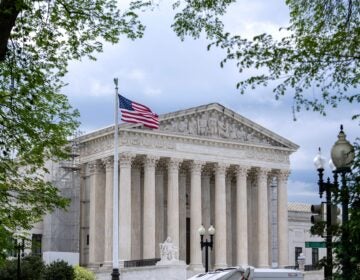Legal professionals in the Philadelphia region celebrate Supreme Court nominee
Ketanji Brown Jackson is the first Black woman nominated to the nation’s highest court. Local attorneys, judges and law students revel in the historic moment.

Judge Ketanji Brown Jackson, who is a U.S. Circuit Judge on the U.S. Court of Appeals for the District of Columbia Circuit, poses for a portrait, Friday, Feb., 18, 2022, in her office conference room at the court in Washington. (AP Photo/Jacquelyn Martin)
Simone Hunter–Hobson, 24, a second-year law student at the University of Pennsylvania, said she was motivated and inspired on Friday upon hearing President Joe Biden had nominated Ketanji Brown Jackson for the Supreme Court.
The D.C. federal appellate court judge would become the first Black woman to sit on the nation’s highest court. Jackson would replace retiring judge Stephen Breyer — for whom Jackson once clerked.
“Sometimes, whether it’s explicit or implied, there is a message that maybe we’re not qualified … so I think it’s important in any capacity to see that type of representation. It does send a message that we can do it. It is possible,” said Hunter-Hobson, who is Black.
“I’m sure there were a lot of barriers, whether in her legal education, legal career to now. But to at least see that she was able to overcome a lot of things and achieve such a great accomplishment, that representation within itself speaks a lot to Black women, and at least for me …. It’s just reaffirming my choice to become a lawyer and be an agent of change in the future,” said Hunter-Hobson.
Judge Demetrica Todd-Ruiz is the first female and first Black chief judge in Vineland, New Jersey municipal court, and said she too is elated by the efforts to diversify the court.
“Representation … truly matters,” she said. “I was also the first in a small town in southern New Jersey,” said Todd-Ruiz. “The fact that I wear natural hair, and just being my authentic self, and representing those who look like me, I see myself in her. My reflection, her reflection, looks the same, so that is why I am so ecstatic.”
Keir Bradford-Grey, a partner in law firm Montgomery McCracken’s Litigation Department and a former Chief Defender for the Defender Association of Philadelphia, shared those sentiments.
“We still have a long way to go in the legal profession, and the legal profession is very heavily dominated by men,” said Bradford-Grey. “Even though there are more and more women that are coming up … we never really understand that we will have the same equal opportunity to be valued for the work we do, to be valued for the vantage point we bring. I’ve always felt like no matter how good I was, there was always going to be a ‘but’ after that,” she said.
“[The nomination] allows me to dream bigger. It just allows me to keep pushing. This allows me to keep encouraging other women to step up and try something different, dare to do something that you’ve never seen someone who looks like you in that role,” said Bradford-Grey. “And I do think this is the beginning of a new understanding of a new sense of pride and responsibility that we will have.”
Jackson previously was a commissioner on the U.S. Sentencing Commission, and she served on the federal district court in D.C. Jackson also would be the first public defender to sit on the Supreme Court. That background, supporters say, would offer a critical perspective on the court.
“When you try cases, you have a front row view, a participatory view of the legal system, both on the civil and criminal side … Then to have that trial experience come by way of being a public defender, someone who represents people who cannot afford counsel and someone who believes in the fact that people who cannot afford counsel have the right to quality representation on the criminal side is very important,” said civil rights attorney Riley Ross, who has years of experience as a public defender.
“Being able to see how the criminal justice system deals with the poor, with those who are charged with crimes, is very important … It also gives you a perspective of what it’s like to go against, and see instances of government overreach, the prosecutorial power that prosecutors wield on the criminal side. They have all the power, especially on the federal side, and the fact that what they charge usually dictates the sentence that the defendant is facing … And also to see how sentencing guidelines affect defendants and how the criminal justice system works overall.”
Attorney Will González, executive director of Ceiba, a coalition-building organization in the Latino community of Philadelphia, has been advocating for a more diverse court.
“It’s important that the institution of the Supreme Court retains its legitimacy in the eyes of the public and in the eyes of the people. And part of that legitimacy is equity, inclusion and understanding, and lived experiences, [that it] reflects the community that it serves,” he said.
“We need, especially in these crazy times, branches of government to have that legitimacy and to reflect the diversity of the community at a time when the demographics of our country are changing.”
An ABC News/Ipsos poll found that just over three-quarters of people in the U.S. wanted Biden to consider “all possible nominees” when choosing a Supreme Court judge, while 23% preferred him to keep his campaign promise of nominating a Black woman. Todd-Ruiz said she hopes the public will realize that Jackson is the most qualified person for the position.
“I want to believe that individuals would not just look at this candidate and see her nomination only because of her gender and race, but they actually look at her background and recognize that she is indeed the most experienced, and she can represent and fill this role just as good as anyone else,” she said.
Bradford-Grey says that being in a position of “first” comes with significant criticism and scrutiny.
“I hope she’s judged very fairly, “ she said. “And, I hope she’s judged the same way as her counterparts.”

Show your support for local public media
WHYY is your source for fact-based, in-depth journalism and information. As a nonprofit organization, we rely on financial support from readers like you. Please give today.







